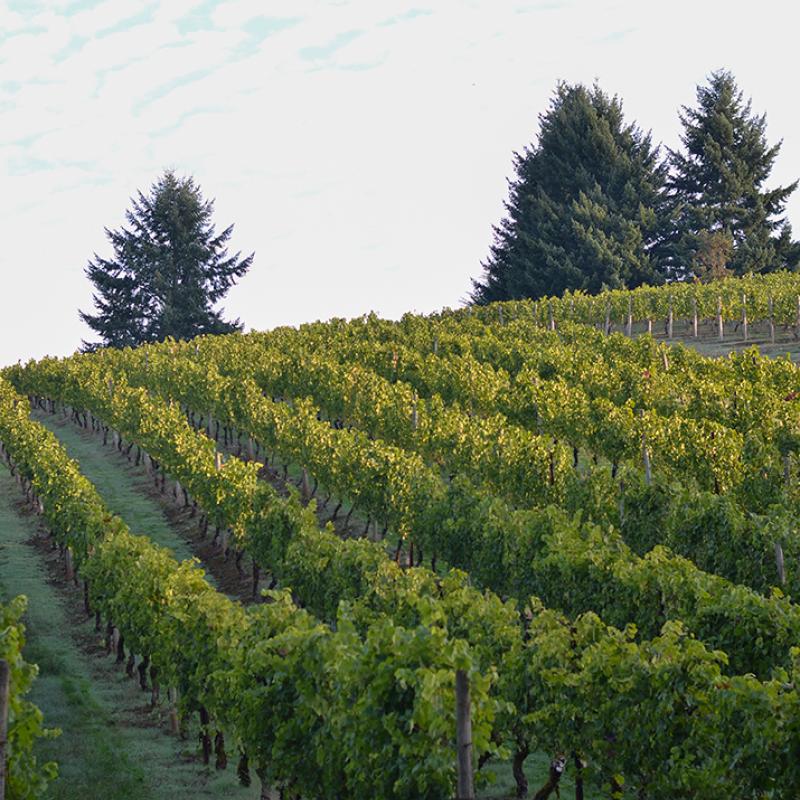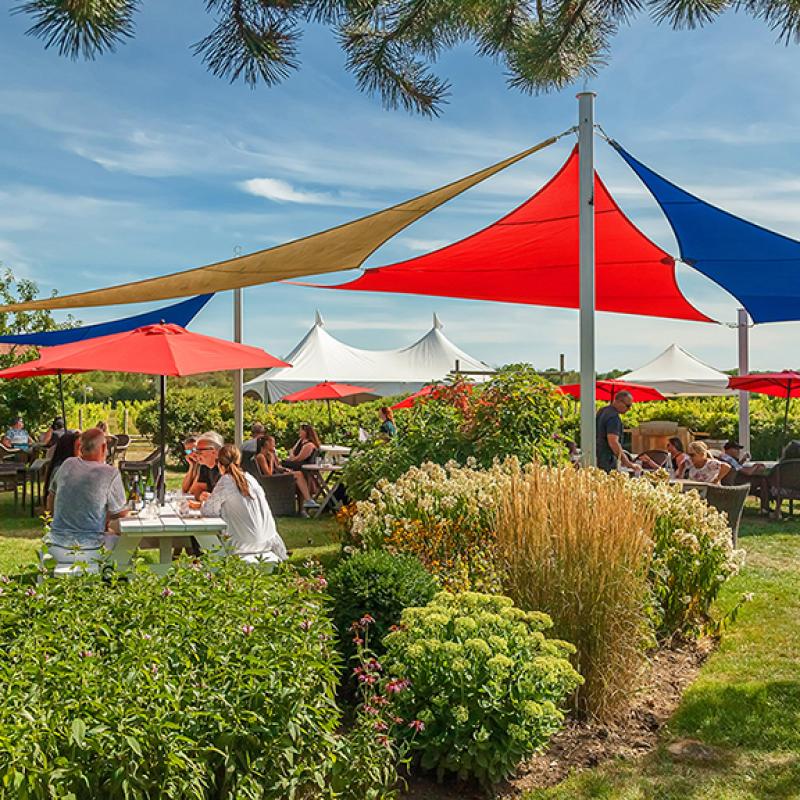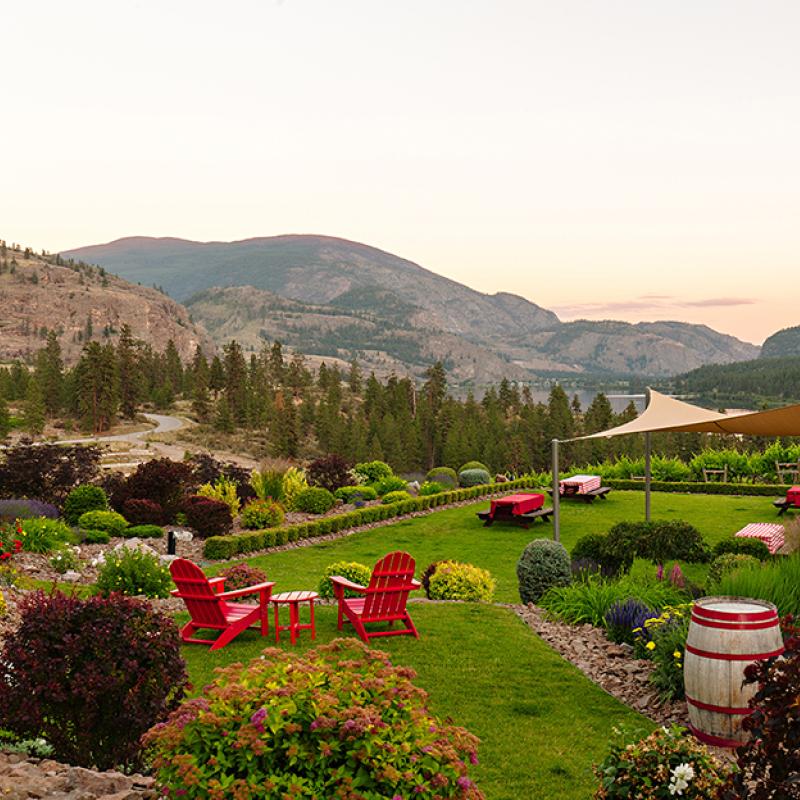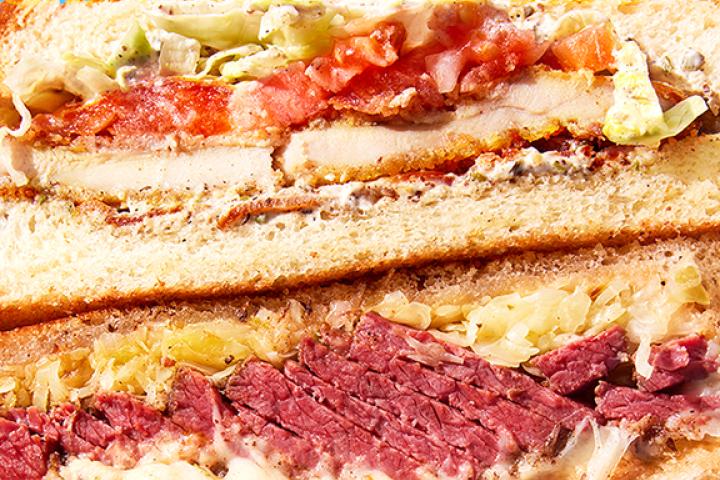There is no school of viticulture at Queen’s, no syllabus for future sommeliers. But raise a glass and you may find your favourite grapes have a Queen’s connection you might not have expected.
In fact, we found a remarkable number of alumni have embarked on careers as vineyard owners or wine experts and, drawing on their Queen’s education in science, law, and even film production, they have uncorked tremendous success. From the lush vineyards of British Columbia’s Okanagan to the volcanic rock and marine sediment of Oregon’s Willamette Valley, and from the new ideas forming in Prince Edward County in Ontario to the centuries-old traditions of Europe, these alumni are making an impact on the wine industry around the world.
We talked to six alumni about their career paths, how their time at Queen’s influenced their work with wine, and what they’d recommend you pour for your next alumni get-together.
Real Nice Winemakers, Soléna Estate Winery, and the Woodshed Wine Company
Alumnus: Anthony Van Nice, MBA’10
Place: Willamette Valley and Dundee Hills, Oregon, U.S.
For many alumni, getting into grapes was the furthest thing from their minds when they started at Queen’s. However, that’s not the case with Anthony Van Nice.
Mr. Van Nice already had a decade of experience in the wine industry when he enrolled in the Cornell-Queen’s MBA program.
Balancing a busy schedule is second nature to Mr. Van Nice. He first pondered a career in wine during a study-abroad program in Mendoza, Argentina. When he returned home to Oregon, he soon landed a job as a “cellar rat” – an affectionate term for an employee who scurries around doing varied and often dirty work. The job is about as glamorous as the name suggests, and Mr. Van Nice was filling barrels, dragging hoses, and cleaning tanks. But it was time well spent. Soon, he was travelling to work harvests in California, Australia, New Zealand, and France.
That global experience helped him nurture Oregon’s wine scene. Mr. Van Nice recalls that when he arrived in Willamette Valley in the early 1990s, it was still a very young wine region, with the original wine pioneers doing everything from driving tractors to keeping track of the books. The industry soon matured but there was plenty of space to grow.
Even as the industry grew more sophisticated, he says it “felt as if it was still underdeveloped in the areas of strategy, management, and finance … I felt like the skills I could develop in the Cornell-Queen’s MBA would be valuable to the growing Willamette Valley wine industry.”
The program was a good fit for someone already busy in a management role, as the teleconference classes and short but intense sessions let Mr. Van Nice study and work concurrently. “It was delivered in a way that made it possible to maintain your career during the week, attend classes on weekends, and attend periodic in-person sessions on the two campuses,” he says.
Today, he is the managing partner and a part owner of Oregon’s Real Nice Winemakers, president of Soléna Estate Winery, and managing partner and co-owner (with his wife, Lindsay Van Nice) of the Woodshed Wine Company.
For all his years in the industry, Mr. Van Nice hasn’t lost sight of his early roots as a cellar rat.
“Despite advances in technology, wine is still an agricultural product at heart. A bottle of wine represents the culmination of a lot of hard work by scores of people in the vineyards and cellars. It has been a magical journey for me.”
Wine recommendation
Mr. Van Nice says he’d love his fellow alumni to try a bottle of Black Magnolia Willamette Valley Pinot Noir by Real Nice Winemakers to get a literal taste of that magical journey. “They call Pinot Noir the heartbreak grape because it can be so challenging. When it is done well it can be ethereal, but when things go wrong, disaster looms. It is why it attracts an obsessive group of people chasing the perfect Pinot Noir.”
Closson Chase Vineyards
Alumni: Seaton McLean, Artsci’78, and Michael MacMillan, Artsci’78
Place: Hillier, Ont.
“I enjoyed wine before I ever thought of making it.”
Seaton McLean was a wine enthusiast long before he was a wine producer. He was a producer of a different kind, crafting stories for television and film. The same goes for his classmate, Michael MacMillan, who enjoyed wine enough to make it – at home, from concentrate. Neither was contemplating a career in wine production until a chance conversation changed everything.
Mr. McLean connected with winemaker Deborah Paskus at a dinner party, enjoying casual conversation about her work. He didn’t think much more about the encounter until months later, when Ms. Paskus delivered a 60-page business plan and a deadline. She had found the perfect plot in Prince Edward County, just an hour or so down the road from Queen’s. But there was a catch – if they wanted it, they’d have to act fast as others were interested.
“We figured what’s the worst that can happen? The land was relatively inexpensive back then … And so I called Deborah back and said, ‘Put an offer in.’ So, she did, and they said yes, and – without realizing it – we were in the wine business,” Mr. McLean recalls. The result is Closson Chase Vineyards, famous for its purple barn. Mr. McLean and Mr. MacMillan are two of the winery’s owners and their education has proved invaluable to the venture.
The Queen’s film studies department in the 1970s was rather unorthodox. Mr. MacMillan shares that students helped run the department. For instance, by his second year, he was a teaching assistant and hiring-committee member. It was an invaluable exercise in independence and motivation. “We had an experience of … taking responsibility and being willing to dive in and not assuming that it was going to get laid out in front of you,” he says.
Students were also given free rein creatively, a crucial quality for winemakers.
“I think almost all the people I know who are in the wine business, I would describe them as storytellers. And I think they see themselves that way, too,”
Mr. McLean says. He adds that the unpredictable and challenging industry is “not for the faint of heart, but we’re still telling the story.”
Mr. McLean helps oversee operations at Closson Chase, having regular conversations with the manager and winemaker. Mr. MacMillan is less hands-on, but he’s developed a special relationship with the land. He and his wife, Cathy (nee Spoel, Artsci’78), moved an old barn onto the land to serve as their country home. “My physical awareness of the place is much deeper,” he says.
Wine recommendation
Queen’s alumni eager to appreciate Closson Chase’s terroir should try the estate’s Churchside Chardonnay and South Clos Pinot Noir.
Noble Ridge Vineyard and Winery
Alumni: Jim D’Andrea, Artsci’77, MA’80, LLB’82, and Leslie D’Andrea, nee MacIntosh, Artsci’81
Place: Okanagan Falls, B.C.
While many people meet and fall in love at university, Noble Ridge Vineyard and Winery owners Jim and Leslie D’Andrea may just have the most movie-worthy story of all – they met while working as bartenders at Alfie’s, the beloved student-run bar.
Though they connected while pouring pints, the D’Andreas didn’t immediately join the wine industry. In fact, their careers were about as far away from farmland as you can get. Mr. D’Andrea enjoyed a robust legal career, while Mrs. D’Andrea focused on health-care management. A 1998 trip backpacking around Europe with their kids (all future Queen’s alumni) changed that.
“My recollection was that we were in France … We were walking through a vineyard, and I said to Leslie, ‘This is what I want to do,’” Mr. D’Andrea recalls.
At first, Mrs. D’Andrea thought he was referring to the European lifestyle. But then it dawned on her. “You want the dirt, don’t you?”
He did, and after considering many options, they bought a plot in the Okanagan Valley in 2001. It came with just 3.5 acres of vines at the time, so some planting was in order. Today, they boast 24 acres of planted vines.
Their journey from being student sweethearts to having a European “aha” moment to owning a vineyard sounds romantic.
“It is romantic,” says Mrs. D’Andrea. “It is. It is fun. It is all that, but it’s hard work … there’s times when you’re working very hard and nature’s not going your way … like the bear that was eating half our Cabernet.”
Ravenous bears aside, their Queen’s education has prepared them for many of the rigours of vineyard life. Mrs. D’Andrea’s background in science means she can dig into agricultural reports. With his legal expertise, Mr. D’Andrea provides hands-on leadership for client contracts and employee agreements. However, they do have a tip for students pondering a winemaking career: don’t forget to study marketing. Mrs. D’Andrea laughs when asked if she wishes she had learned anything to help her current career and describes how marketing is a massive part of running a vineyard.
And for those who are curious, now that Mr. D’Andrea has gotten the land he wanted so much, he does indeed play with it. Even in winter you’ll find him outside, battling the snow as he prunes vines. He jokes that the staff knows to confine him to just one small section of the grapes so he doesn’t cause too much mayhem.
Wine recommendation
To gain an appreciation for the soil that Jim and Leslie D’Andrea love so much, they suggest you start with their sparkling wines. The One is their primary sparkling and their personal favourite.
Nyetimber
Alumna: Cherie Spriggs (Artsci’00)
Place: West Sussex, U.K.
In the effervescent world of winemaking, Cherie Spriggs creates masterful blends, not just with her grapes but also through combining scientific precision and artistic finesse. Her Queen’s education is right there in the mix.
As the head winemaker for Nyetimber, Ms. Spriggs (whom one critic referred to as “the Canadian superstar of English bubbly”) has been instrumental in transforming the English sparkling wine landscape. In 2018, she made history as the recipient of the prestigious Sparkling Winemaker of the Year award at the International Wine Challenge, becoming the first woman and the first person from outside France and Champagne to take the title.
Being a Queen’s alumna played a significant part in her accomplishments.
“Winemaking, particularly sparkling winemaking, to be done at its best, requires a blend of top-level understanding of the technical scientific aspects … I did my degree at Queen’s in biochemistry, which gave me an outstanding background in science. I still needed to do an oenology degree there-after to be trained in the winemaking science, but that was something I could quite easily do as a postgraduate degree since my science training from Queen’s was so strong.”
Nyetimber’s commitment to using only 100 per cent estate-owned and -grown grapes, meticulously cared for across 11 vineyards, means that every bottle produced is of the highest quality.
Wine recommendation
“At Nyetimber, the best of our best is our prestige cuvée, named 1086 by Nyetimber. It is only made in the best years in small quantities with only the absolute best vineyard parcels for Chardonnay, Pinot Noir, and Pinot Meunier … Such a value of excellence aligns very well with what Queen’s taught its students and I’m sure its alumni continue to hold dear.”
Meet some of the alumni who have found the recipe for success with craft beer and cider.
By Peter Simpson
It’s not just the world of wine where Queen’s alumni are having an impact. You’ll find a touch of the tricolour at breweries or cideries across Canada (and around the world) where alumni are making their mark with creative approaches to craft beer and cider. We contacted two craft breweries and one cidery to find out what makes their brand unique, and how their education at Queen’s played a role in their success. Our respondents are:
Farmgate Cider
Alumnus: Jim Davies, Sc’86, Brenda (Andrews) Davies, Artsci’83, Artsci’84, Ed’85, Artsci’88, Jacob Davies, Sc’12, and Meaghan Dalby Davies, Artsci’12
Place: Arnprior, Ont.
Good Robot Brewing
Alumnus: Joshua Counsil, Sc’09, Angus Campbell, Sc’09, Doug Kehoe, Sc ’10
Place: Halifax, N.S.
Something In The Water Brewing
Alumnus: Steve Waugh, Artsci’05
Place: Kingston, Ont.
How did your Queen’s education prepare you for the world of craft beer/cider?
Farmgate: With four Queen's grads on staff, our foundation encompasses biology, engineering, history, education and fine art. Growing a business requires a lot of business savvy, problem solving, creativity and communication strategies. Queen's cultivated our desire to be life-long learners and to appreciate and recognize the skills and talents of each other.
Good Robot: The three founders of Good Robot lived together on Aberdeen Street in Kingston. University social gatherings taught us about how to include people, make them feel special, how to curate an experience.
Something In the Water: While my Queen’s class load provided a rigour that has been applied to business, the real learning was my time on Princess Street. Serendipitously, I became an owner of a brewery and taproom on the same street that I walked throughout university. It was the real-world learning of Kingston that prepared me for Something in the Water on Princess Street.
What makes your brewery/cidery unique in your marketplace?
Farmgate: We have a strong commitment to sustainability. We manage our orchards organically, use ozonated water for sterilization, heat with geothermal, produce electricity with solar panels and have eliminated single-use plastics. We are responsible to the land, our craft, our customers and each other.
Good Robot: We are the only brand to offer full-service contract beverage manufacturing and co-packing services for both alcoholic and non-alcoholic beverages in Nova Scotia. This means we can make any beverage in a can – non-alcoholic, wine, espresso martinis, energy drinks, cider, whatever. This means a kid with a dream can launch an innovative beverage, like Ace Beverages’ co-founder Cam McDonald did, without building an expensive facility. His brand was acquired for $148.5 million.
Something In The Water: Our space has more of a café feel than brewery and is flanked by a pink velvet banquette. Elegant light fixtures and stemmed glassware are atypical for breweries. What needs to speak the loudest is the liquid, and we’re proud to have been recognized as Canada’s 2022 New Brewery of the Year on the back of our curious beers.
You can recommend one of your beers/ciders to fellow alumni. Which do you pour for them?
Farmgate: One of our single varietal ciders, like North Road, or a Russet cider, very different ciders that share the authenticity of the apple they came from.
Good Robot: ThemBot Sour was the only Nova Scotia beer at LCBO last summer. I took a pilgrimage to Kingston to buy a can of it, which I enjoyed on the lawn of our former Aberdeen residence. I'd also serve them Good Robot Ultra. It was built for a Dixie Cup.
Something In The Water: Our Pancake Bay Sweet Brunch Stout put us on the map, winning Silver at the World Beer Awards. (It has) five kinds of malts, with flaked oats and milk sugar to sweeten it, and is steeped in fresh roasted ground coffee and finished with maple syrup. It’s OK to have beer for breakfast.














